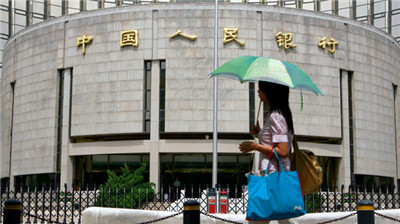(单词翻译:单击)
China’s central bank has warned investors to expect more “two-way volatility” in renminbi trading when foreign exchange markets reopen on Monday, less than a week after a 2 per cent downward “adjustment” sparked a week of roller-coaster trading for the currency.
中国央行警告投资者称,外汇市场周一开盘时预计人民币汇率将出现更多“双向波动”。不到一周前,央行将人民币汇率向下“调整”2%,引发一周的人民币汇率过山车行情。
In a statement issued on Sunday, Ma Jun, chief economist at the People’s Bank of China, said the Chinese government had “no intention or need to participate in a ‘currency war’”.
在周日发表的一份声明中,中国央行首席经济学家马骏称,“中国没有意图和需要来参与‘汇率战’”。

On August 11 the PBoC shocked global markets by lowering the renminbi’s daily dollar “reference rate” 1.9 per cent in what it termed a “one-off depreciation”.
8月11日,中国央行把人民币兑美元汇率中间价下调了1.9%,并称之为“一次性校正”,此举震惊了全球市场。
The central bank said it would set the daily reference rate nearer to the renminbi’s previous market close in an effort to make the mechanism more market-driven — a goal of governor Zhou Xiaochuan as he seeks to earn overseas acceptance of China’s “redback” as an international reserve currency.
中国央行表示,将使汇率中间价更接前一日收盘价,以便在更大程度上让市场力量决定汇率——这是中国央行行长周小川希望实现的一个目标,目的是让海外接受人民币作为一种国际储备货币。
Previously the central bank had exercised wide discretion in setting the reference rate, allowing the renminbi to creep up gradually against the dollar in recent years.
此前中国央行在设定汇率中间价时行使了很大的自由裁量权,近年来允许人民币兑美元缓慢升值。
The PBoC’s move sparked three days of steep falls against the dollar. This invited speculation that the government wanted to devalue the renminbi to revive a slowing economy, even if doing so sparked a renewed round of “currency wars” by encouraging other countries to follow suit.
中国央行的举动引发了人民币兑美元汇率连续3天的大幅下跌。这令外界猜测,中国政府想要通过贬值来重振正在放缓的经济,即便这么做会鼓励其他国家跟着做,引发新一轮“汇率战”。
In response the central bank intervened to pare back some of the renminbi’s losses against the dollar and convened an impromptu press conference by deputy governor Yi Gang on August 13 to warn markets that a large-scale devaluation was not in the offing.
作为回应,中国央行进行了干预,部分收复了人民币兑美元汇率的失地,由央行副行长易纲在8月13日临时召集了一场记者会,警告市场称,人民币不会大规模贬值。
Mr Ma said, in statement issued just hours ahead of the press conference, the PBoC was “fully capable of stabilising the market exchange rate” thanks to China’s $3.7tn foreign exchange stockpile.
就在记者会召开几小时之前,马骏在一份声明中称,由于中国拥有3.7万亿美元外汇储备,中国央行“完全有能力稳定市场汇率”。
Having talked the renminbi down — and then back up — against the dollar last week, Mr Ma’s statement on Sunday appeared to warn investors not to expect further signalling from the central bank. The PBoC would intervene only in “exceptional circumstances” to counteract “excessive volatility”, he said.
上周先是表态压低人民币兑美元汇率、然后又表态推高人民币兑美元汇率之后,马骏在周日的表态似乎是在警告投资者,不要预期中国央行发出更多信号。他说,只有在“特殊情况”下,中国央行才会进行干预,以消除人民币汇率的“过度偏离基本面的短期波动”。
Ma Jun, chief economist at the People’s Bank of China, said the Chinese government had “no intention or need to participate in a ‘currency war’”.Last week’s moves were aimed in part at restoring the international credibility of China’s financial reform programme, which was badly dented by an initially clumsy effort last month to arrest steep falls on its stock markets.
身为央行首席经济学家的马骏表示,“中国没有意图和需要来参与‘汇率战’”。央行上周举动的部分目的在于恢复中国金融改革在国际上的可信度,上月官方在遏止股市大幅下跌过程中最初的笨拙手法严重损害了这一可信度。
On Friday the International Monetary Fund welcomed the PBoC’s adjustments to the reference rate mechanism.
上周五,国际货币基金组织(IMF)对中国央行调整汇率中间价形成机制表示了欢迎。
Also on Friday China’s security regulator indicated that it was prepared to stabilise the stock markets “for a number of years” through a state-backed fund. The China Securities Regulatory Commission has organised a so-called “national team” of state-owned brokers and fund managers, which have pledged not to sell shares until the Shanghai Composite index returns to 4,500 points.
同样在上周五,中国的证券监管机构表示,准备通过一个国家出资的基金,在“几年之内”稳定股市。中国证监会(CSRC)组织了由国有券商和基金管理公司组成的所谓“国家队”,承诺在上证综指(Shanghai Composite index)重回4500点之前不减持。


